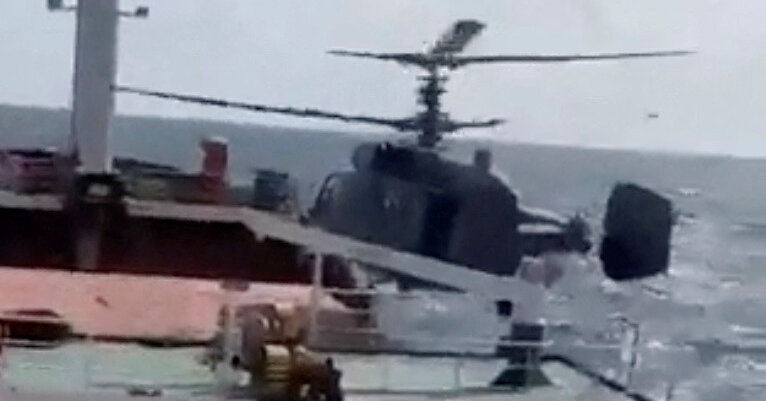Black Sea Clashes Grow as Russia Fires Warning Shots and Boards a Freighter

The Russian military’s decision to fire warning shots and board a freighter in the Black Sea this weekend has added a new level of uncertainty to the increasingly intense maritime theater of war, as Moscow, apparently for the first time, made good on its threat to treat Ukraine-bound civilian shipping as potentially hostile.
The Russian Ministry of Defense on Sunday announced the action, which was confirmed by Ukrainian officials, and video verified by The New York Times shows a military helicopter hovering above the cargo ship Sukru Okan. A group of people in military gear can be seen walking on the deck and climbing into the helicopter, while eight men in civilian clothes — apparently the ship’s crew — sit nearby.
It remains to be seen how the boarding of the ship might affect the flow of grain by sea from Ukraine, but some shipping industry analysts and executives said they did not think the episode would greatly affect a trade that had already been constricted by a virtual Russian blockade to a small fraction of its usual volume.
But it reflects the rising tensions on the Black Sea, which Western analysts have warned could escalate into violence involving countries not directly involved in the war. Russia’s warning last month about treating third-country shipping as hostile raised fears of armed clashes, and since then, Ukraine’s increasingly robust naval drone force has launched several attacks on Russian warships.
“We are, of course, concerned that Russia’s military may expand their targeting of Ukrainian grain facilities to include attacks against civilian ships in the Black Sea,” a State Department spokesman, Vedant Patel, said on Monday.
Since withdrawing last month from a deal that allowed ships carrying foodstuffs to leave Ukrainian ports, Russia has heavily bombarded those ports, notably Odesa, destroying more than 200,000 tons of grain, according to the government in Kyiv, and badly damaging the infrastructure needed for those exports to resume. Ukrainian officials claimed on Monday that air defenses had shot down all 15 attack drones and eight cruise missiles fired overnight at Odesa, but said that falling pieces caused damage, fires and injuries.
With Ukraine’s main ports shuttered, its shipping has been limited to exports on the Danube River through much smaller ports — which have also been attacked, but not as often — and aboard much smaller vessels.
The boarding of the Sukru Okan will contribute to concerns about the viability of that route, but on its own is unlikely to tip the balance in the thinking of shippers, said Andrey Sizov, the head of SovEcon, a Black Sea grain markets consultancy.
“It’s just another reminder there’s a war going on in that region,” Mr. Sizov said.
Ukraine’s Foreign Ministry said in a statement on Monday, “We call on the international community to take decisive action to prevent the Russian Federation’s actions that impede the peaceful passage of vessels through the Black Sea.”
Russia has said it was within its legal rights to stop and inspect the ship.
Most ships heading to or from Ukraine now generally avoid Ukrainian coastal waters, instead steaming through a branch of the Danube that empties at Sulina, Romania. Sites that track maritime traffic often show dozens of vessels clustered just off Sulina. Upstream, that branch joins the main body of the river, where it forms the border with Ukrainian and has a few Ukrainian river ports, primarily Izmail.
Russia’s Ministry of Defense said that on Sunday morning, its patrol ship Vasily Bykov detected the Sukru Okan — a small freighter listed at 2,155 tons and registered in the tiny Pacific island nation of Palau — bound for Izmail. The 34-year-old vessel is owned and managed by a Turkish company, according to Equasis, a major shipping database. The Times was unable to reach the owner for comment.
The patrol ship fired warning shots with automatic small arms, the Defense Ministry said, when the ship initially failed to respond to a request to stop for inspection to see if it was carrying any prohibited goods. The ministry said in a post on the Telegram messaging app that the Russian ship then sent a helicopter with a boarding team.
The video, apparently shot from the cargo ship’s bridge, was widely posted by Russian military bloggers and news organizations. The ship in the video matches archived images of the Sukru Okan, according to a Times analysis. After inspecting the ship, the Russians left and let the vessel continue on its way; on Monday, it was off the Romanian coast.
Ships going to and from Ukraine via the Danube generally hug the Black Sea coastlines of Bulgaria, Romania and Turkey — all members of NATO — staying within those nations’ territorial waters to avoid the Russian blockade. But, according to the Sukru Okan’s transponder data, it was just beyond Turkish territorial waters when it was stopped.
If the vessel was in international waters, it was not immediately clear whether Russia’s actions were allowed under the 1936 Montreux Convention, which covers the rights of naval vessels of belligerent nations to regulate commercial traffic on the Black Sea during a time of war.
Some major shipping companies abandoned the Black Sea grain trade after Russia imposed its blockade on July 17 because the risk was too great, the rewards too small or their ships too big for river traffic.
Companies with “nice, new ships” are unlikely to take on the risks, especially given the potential for fatalities, said an executive of a company that operates a ship waiting to load grain at Reni, a Ukrainian Danube port. He spoke on the condition of anonymity out of concern for the safety of the ship and its crew.
The executive said that his insurance premiums had not risen because his ship was registered in Turkey, and the Turkish government was subsidizing insurance rates for certain ships. Still, certain companies would be rethinking any planned routes in the region after the latest attack, he said.
Mr. Sizov, the consultant, said that the threat military action could, in theory, drive up insurance premiums for shippers, but that many of the smaller vessels now involved in Ukrainian trade were uninsured, anyway. For now, he said, rising prices for that freight provide an incentive to continue the traffic.
Anton Troianovski contributed reporting.



